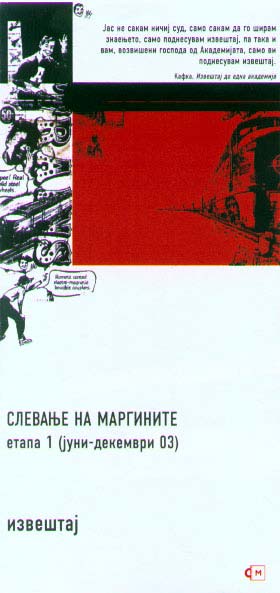|
25.12.2003
memorial house of Vasil Glavinov, Veles
Exhibition by Atanas Botev, "Kinds of
sights"., promotion of the project Confluent Margins,
promotion of Margina 62, promotion of the activities of the Center
for contemporary and public art "Elementi", from Bitola,
|
|
In
the beautiful house of Vasil Glavinov, renovated and conservated
recently, with the participation of around 30 people from Veles a
complex event took place consisting of: Exhibition by Atanas Botev, "Kinds
of sights"., promotion of the project Confluent Margins,
promotion of Margina 62, promotion of the activities of the Center
for contemporary and public art "Elementi", from Bitola |
|
|
|
 "Elementi"
made a video presentation of their work, of their
organization and of their local and international projects. "Elementi"
made a video presentation of their work, of their
organization and of their local and international projects.
Atanas Botev
is Born 1973 in Skopje. He graduated from the Faculty of
Fine Arts in Skopje 1997 with prof. Kostadin Tancev-Dinka.
He received MA from the Faculty of Fine Arts in Skopje in
1999. Member of the Association of Fine Artists of Macedonia
(DLUM) from 2000. "Kinds of Sights" is his
second solo exhibition consisting of six interactive prints.
The sense of sight,
more precisely, the cultural determination of the sight, as
well as the problems of perception, are the basic
preoccupation of Atanas Botev in his latest project entitled
Kinds of Sights. He has started it in 2002 as a
series of graphic prints that were, primarily, researching
the visual qualities of different signs used in the tests
for determining the diopter. Gradually, the project Kinds
of Sights grew into a research project that resulted in
certain paradoxical discoveries on the visual culture.
With his interactive graphic prints Botev simulates a test
for determining the diopter. Concurrently, he introduces a
made up test with Cyrillic signs, since he finds out that,
despite the fact that the Cyrillic alphabet is our cultural differentia
specifica, such a test has never been used in the local
ophthalmologic examinations. The paradox that the
ophthalmologic tests in Macedonia still include Latin signs
(despite the fact that the Cyrillic letters have been
created on the territory of Macedonia, in the 9th century,
by the Slavic educators Cyril and Methodius as the most
adequate sings for denoting the local language), provoked
the artist to reexamine this phenomenon.
Namely, all the possible misunderstandings that may arise
from the use of an alphabet that is not always completely
mastered by the local citizens incites disputes on the
language and the cultural hegemony of the past, thus
revealing a hidden policy of power in an apparently naive
cultural failure. |
|
|
|

|